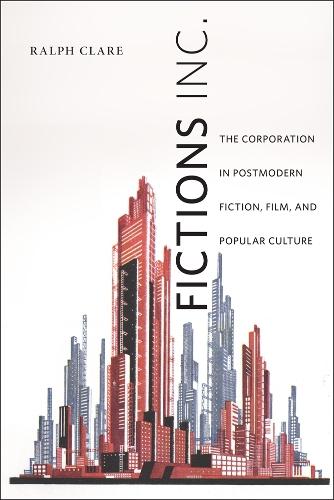Overview
Fictions Inc. explores how depictions of the corporation in American literature, film, and popular culture have changed over time. Beginning with perhaps the most famous depiction of a corporation-Frank Norris’s The Octopus-Ralph Clare traces this figure as it shifts from monster to man, from force to “individual,” and from American industry to multinational “Other.” Clare examines a variety of texts that span the second half of the twentieth century and beyond, including novels by Thomas Pynchon, William Gaddis, Don DeLillo, Richard Powers, and Joshua Ferris; films such as Network, Ghostbusters, Gung Ho, Office Space, and Michael Clayton; and assorted artifacts of contemporary media such as television’s The Office and the comic strips Life Is Hell and Dilbert. Paying particular attention to the rise of neoliberalism, the emergence of biopolitics, and the legal status of “corporate bodies,” Fictions Inc. shows that representations of corporations have come to serve, whether directly or indirectly, as symbols for larger economic concerns often too vast or complex to comprehend. Whether demonized or lionized, the corporation embodies American anxieties about these current conditions and ongoing fears about the viability of a capitalist system.
Full Product Details
Author: Ralph Clare
Publisher: Rutgers University Press
Imprint: Rutgers University Press
Dimensions:
Width: 15.20cm
, Height: 2.00cm
, Length: 22.90cm
Weight: 0.399kg
ISBN: 9780813565873
ISBN 10: 0813565871
Pages: 262
Publication Date: 11 September 2014
Audience:
Professional and scholarly
,
Professional & Vocational
Format: Paperback
Publisher's Status: Active
Availability: In Print

This item will be ordered in for you from one of our suppliers. Upon receipt, we will promptly dispatch it out to you. For in store availability, please contact us.
Reviews
This well-conceived, well-executed, and theoretically informed study is wonderfully original--it will appeal not only to literature scholars but also, I should think, to all interested in economics, sociology, literary theory, and film. --David Cowart author of Thomas Pynchon and the Dark Passages of History and Trailing Clouds
Fictions Inc is highly topical and fills the existing void in literary criticism, namely in the depiction of the corporation ... this well-informed study shows that literature and culture are not only engaged in racial and sexual politics, but also in the examination and critique of late capitalism.
In the wake of the financial collapse and the Occupy movement, Fictions Inc. anatomizes the corporation's hostile takeover of American culture and argues for fiction's and film's ability to resist the current order--and demonstrates criticism's ability to do the same. --Samuel Cohen author of After the End of History: American Fiction in the 1990s (06/10/2014) This well-conceived, well-executed, and theoretically informed study is wonderfully original--it will appeal not only to literature scholars but also, I should think, to all interested in economics, sociology, literary theory, and film. --David Cowart author of Thomas Pynchon and the Dark Passages of History and Trailing Clouds This well-conceived, well-executed, and theoretically informed study is wonderfully original it will appeal not only to literature scholars but also, I should think, to all interested in economics, sociology, literary theory, and film. --David Cowart author of Thomas Pynchon and the Dark Passages of History and Trailing Clouds
Fictions Inc is highly topical and fills the existing void in literary criticism, namely in the depiction of the corporation ... this well-informed study shows that literature and culture are not only engaged in racial and sexual politics, but also in the examination and critique of late capitalism. --American Studies This well-conceived, well-executed, and theoretically informed study is wonderfully original--it will appeal not only to literature scholars but also, I should think, to all interested in economics, sociology, literary theory, and film. --David Cowart author of Thomas Pynchon and the Dark Passages of History and Trailing Clouds In the wake of the financial collapse and the Occupy movement, Fictions Inc. anatomizes the corporation's hostile takeover of American culture and argues for fiction's and film's ability to resist the current order--and demonstrates criticism's ability to do the same. --Samuel Cohen author of After the End of History: American Fiction in the 1990s
Author Information
RALPH CLARE is an assistant professor of English at Boise State University.




